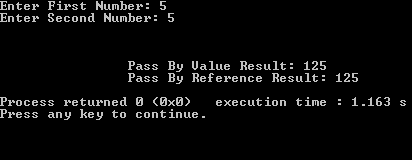Write a program in c++ programming to multiply two numbers using pointers.
Make a function for multiplication that takes input from the user.
There should be three functions and each should return a different data type int, float and double.
Prototypes for functions are
Prototypes for functions are
This program has been tested on c++ code blocks IDE
C++ source code:
see also: pointer addition example source code
#include <iostream> using namespace std; int Mult(int *, int *); float Mult1(int *, int *); double Mult2(int *, int *); int main(){ int a,b; cout<<"Enter 1st Value:"; cin>>a; cout<<"Enter 2nd Value:"; cin>>b; cout<<"...............Multiplication.........." <<endl <<endl; cout<<"The integer Multiplication of these numbers is:"<<Mult(&a,&b)<<endl; cout<<"The float Multiplication of these numbers is:"<<Mult1(&a,&b)<<endl; cout<<"The double Multiplication of these numbers is:"<<Mult2(&a,&b)<<endl; cout<<endl <<endl; return 0; } int Mult(int *x, int *y){ int Prod; Prod=(*x * *y); return Prod; } float Mult1(int *x, int *y){ float Prod; Prod=(*x * *y); return Prod; } double Mult2(int *x, int *y){ double Prod; Prod=(*x * *y); return Prod; }
Program input-output
If you don't want to write prototypes then just add three methods above the main method.
Suggestion number 1
I suggest first remove the prototypes then examine the errors the c++ compiler (IDE) will show. This will help to understand errors also.
Suggestion number 2
We have 3 methods with all methods take two integers as arguments. Try by changing argument data types and return types and examine the different cases in which your code is working and not working.
Always keep doing experiments with the code for fast learning.
Each and every time you face an error you learn.










